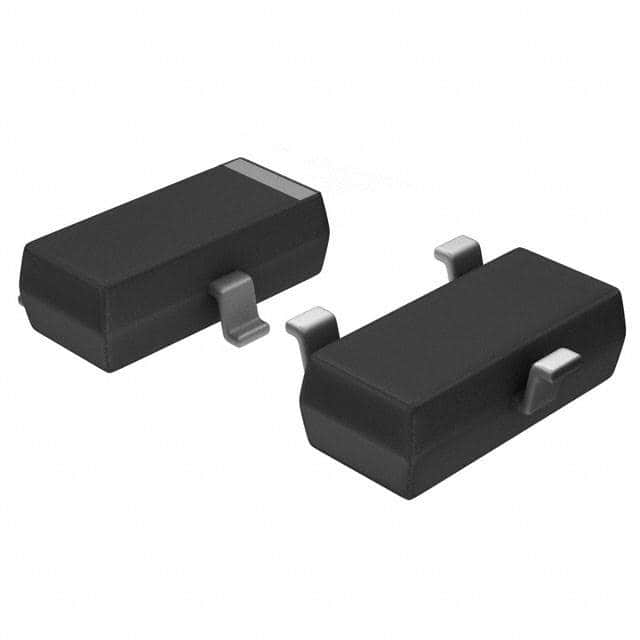Viz Specifikace pro podrobnosti o produktu.

BSS79C Transistor
Product Overview
Category
The BSS79C transistor belongs to the category of small-signal N-channel MOSFET transistors.
Use
It is commonly used for amplification and switching of electronic signals in various applications.
Characteristics
- Low on-resistance
- High transconductance
- Low input and output capacitance
- Fast switching speed
Package
The BSS79C transistor is typically available in a SOT-23 package.
Essence
This transistor is essential for low-power, high-frequency applications.
Packaging/Quantity
It is usually supplied in reels with quantities varying based on manufacturer specifications.
Specifications
- Drain-Source Voltage (VDS): 100V
- Continuous Drain Current (ID): 0.1A
- Total Power Dissipation (PD): 0.36W
- Operating and Storage Temperature Range: -55°C to +150°C
Detailed Pin Configuration
The BSS79C transistor has three pins: 1. Source (S) 2. Gate (G) 3. Drain (D)
Functional Features
- Low power consumption
- High gain
- Fast response time
- Small form factor
Advantages and Disadvantages
Advantages
- Suitable for low-voltage applications
- Fast switching speed
- Compact size
Disadvantages
- Limited maximum current handling capability
- Sensitivity to static electricity
Working Principles
The BSS79C operates based on the principles of field-effect transistors, where the voltage applied to the gate terminal controls the flow of current between the source and drain terminals.
Detailed Application Field Plans
The BSS79C transistor finds application in various fields including: - Audio amplifiers - Signal processing circuits - Switching circuits - Oscillator circuits - Voltage regulators
Detailed and Complete Alternative Models
Some alternative models to the BSS79C transistor include: - 2N7002 - BS170 - IRF530
In conclusion, the BSS79C transistor is a versatile component with applications across various electronic circuits, offering advantages such as low power consumption and fast switching speed. However, it is important to consider its limitations, particularly in terms of current handling capability and sensitivity to static electricity.
[Word count: 314]
Seznam 10 běžných otázek a odpovědí souvisejících s aplikací BSS79C v technických řešeních
What is BSS79C?
- BSS79C is a PNP medium power transistor used for general purpose switching and amplification.
What are the typical applications of BSS79C?
- BSS79C is commonly used in audio amplifiers, voltage regulators, and motor control circuits.
What is the maximum collector current of BSS79C?
- The maximum collector current of BSS79C is typically around 1.5A.
What is the maximum collector-emitter voltage of BSS79C?
- The maximum collector-emitter voltage of BSS79C is typically around 80V.
What are the key features of BSS79C?
- BSS79C features low saturation voltage, high current gain, and low equivalent on-resistance.
Can BSS79C be used for switching applications?
- Yes, BSS79C is suitable for switching applications due to its low saturation voltage and high current gain.
Is BSS79C suitable for use in audio amplifier circuits?
- Yes, BSS79C is commonly used in audio amplifier circuits due to its medium power capabilities.
What are the recommended operating conditions for BSS79C?
- The recommended operating conditions for BSS79C include a maximum collector current, maximum collector-emitter voltage, and appropriate base current.
Are there any alternative transistors that can be used in place of BSS79C?
- Alternative transistors with similar characteristics to BSS79C include BC557, 2N3906, and S8550.
Where can I find the detailed datasheet for BSS79C?
- The detailed datasheet for BSS79C can be found on the manufacturer's website or through electronic component distributors.

